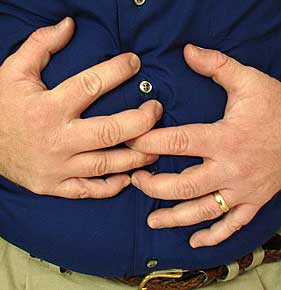A bleed from the stomach is a crisis! Nevertheless, the evidence from a number of studies of aspirin gives some reassurance about the seriousness of the stomach bleeds caused by aspirin. [6]
First: The risk reduces over time, and after about three years of aspirin taking the evidence from trials suggests that taking aspirin poses little additional risk of a bleed.[5, 6]
Second: The likelihood of a stomach bleed is increased greatly if the stomach is diseased, that is, if there is already a stomach ulcer, or an infection of the stomach.[2] Before taking aspirin, people who have, or have had stomach trouble, and those with frequent indigestion should seek advice about whether or not they should take aspirin at all, or whether they should take a stomach protecting drug along with the aspirin. These protecting drugs can markedly reduce the risk of a stomach bleed.[7-8]
Third: The stomach bleeds caused by aspirin appear not to be as serious as spontaneous bleeds in patients not taking aspirin (9). Therefore, although a spontaneous stomach bleed occasionally leads to death, there appears to be no valid evidence that bleeds attributable to low-dose aspirin are ever fatal. Relevant evidence comes from careful overviews of trials involving tens of thousands of subjects. [see references 10-16].
Fourth: The stomach bleeds caused by aspirin are nothing as serious as the disease events prevented by aspirin – heart attacks and cancers. A numb er of very careful studies have examined this balance between the risks and the benefits of aspirin and have concluded that low-dose daily aspirin (70-100 mg daily) is highly beneficial and increases disease-free survival (17-22)
